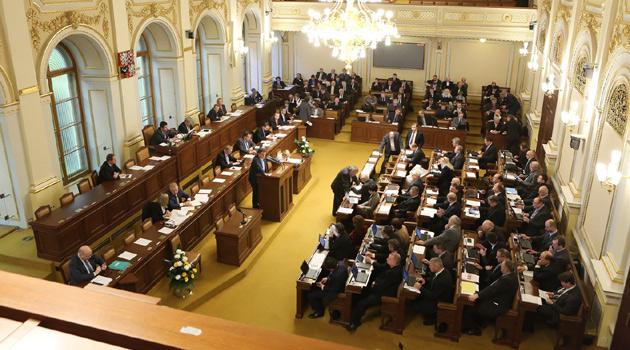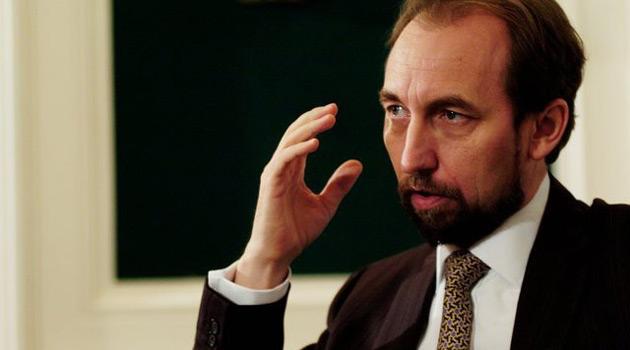In echo of totalitarian past, 60 Czech MPs want anybody "defaming" the President to serve a year in prison

A group of 60 Czech MPs wants to make it a crime once more to publicly defame the President, punishable by up to a year in prison, a proposal that has drawn a reaction of rejection from other politicians, including Czech Prime Minister Bohuslav Sobotka (Czech Social Democratic Party – ČSSD). Representatives of the right-wing opposition called the bill reminiscent of the normalization era of the 1970s and a “return to the Communist protection of whoever happens to be a big cheese”.
The authors of the bill, which is co-sponsored by ANO, ČSSD, the Communist Party of Bohemia and Moravia (KSČM) and Úsvit (Dawn), with Czech MP Zdeněk Ondráček (KSČM) taking the lead, are convinced that the law will have a “preventive effect”, and say the proposed sanctons would have an “educational character”. The new regulation would read as follows: “Whoever publicly defames the President of the Republic, thwarts the performance of his powers and thereby tarnishes the dignity of the office will be punished by deprivation of liberty for up to one year, by a fine, or by forfeiture of assets.”
The proposed law includes additions to the law on misdemeanors as well. Persons disrespecting the position of the President during the exercise of his powers would be at risk of prosecution.
Even though the amendment to the Criminal Code was signed by some MPs from the ANO movement and the Social Democrats, other politicians from those governing coalition parties are against it. “I am concerned that if we were to revive this kind of crime, then criminal law would begin to be used as a weapon of political competition. It’s difficult to say where that might lead,” Sobotka said in response to the bill.
According to Czech Justice Minister Robert Pelikán (ANO), what already ensures the dignity of the head of state is precisely the fact that the office is not protected by special laws or threats of imprisonment. “Special protection for the head of state against verbal assault is an anachronism,” he said.
On the other hand, KSČM chair Vojtěch Filip, who signed on to the proposal, believes it is necessary to fill an existing vacuum in the law. “Given that not just bureaucrats but also judges are protected against verbal assault, the decision to abolish such protection for the office and person of the President appears to be a gap in the law,” he said.
According to the explanatory memorandum that accompanied the bill, those submitting it are promising that “in the future, excesses against the President of the Republic, gross public insults of him, should not happen.” The chair of the opposition TOP 09 party, Miroslav Kalousek, said that even if the amendment were never approved, that, too would be in the interests of current Czech President Zeman.
“If that law passed, Zeman would break it himself at least once a week,” Kalousek tweeted. Petr Fiala, chair of the Civic Democratic Party (ODS), said he was amazed at what the MPs were spending their time on.
“Somebody might defame them next. They can write another law for that, though,” Fiala posted on social networks.
Czech MP Jiří Mihola of the governing coalition Christian Democrats (KDU-ČSL), who chairs that party’s faction in the lower house, joined the criticism, saying that in a democratic state it would be absurd to return defamation of the President to the Criminal Code. Some MPs also pointed out that in general the felony of slander already exists, which in their view is enough.
Another skeptic is the incoming Minister for Human Rights and Legislation, Czech MP Jan Chvojka (ČSSD). It will apparently be he who will submit a legal opinion to the Government about the bill.
“I think strong personalities such as President Zeman will get by just fine without being protected by the Criminal Code,” the incoming Human Rights Minister said. Such protection for the head of state existed in the legal system during the First Czechoslovak Republic (1918-1938), according to the authors of the bill.
During the communist era, defamation of the republic and its representatives was a felony, and those convicted of it served up to two years in prison. During the 1990s, however, such crimes were removed from the law.
The authors of the bill refer to other European states with similar laws. They specifically mention the example of the Netherlands, where this year a court sentenced the writer of a defamatory article about the royal family who published it on Facebook to one month in prison.
Sobotka rejects the use of criminal law in political competition
The Czech PM said he believes reviving the crime of publicly defaming the President of the Republic would begin the use of criminal law as part of political competition. “It’s difficult to say where that would end,” he told a press conference yesterday, expressing his amazement at what the MPs seemed to be concerned about.
Sobotka said he believes there are more important laws and matters the MPs should be addressing. He called the bill “absurd and risky”, even though in his view the head of state undoubtedly deserves respect. “I consider any similar efforts aimed at curtailing freedom of speech and thereby limiting the basic democratic values of our society to be inappropriate,” the PM wrote in a press release.
The Government will assess the amendment prior to its next reading in the legislature. “I really wonder what the MPs have to be so worried about that they would submit such proposals. I think there are more important problems facing the citizens that we should solve,” Sobotka told journalists after holding a performance review meeting with Czech Trade and Industry Minister Jan Mládek (ČSSD).
In the lower house, according to Sobotka, many bills await discussion that might actually improve society. Moreover, he believes the bill about defamation contravenes existing judgments from the European Court of Human Rights.
“The Strasbourg tribunal has repeatedly stated that a public official, and especially a top-level politician, must bear a higher degree of criticism than an ordinary citizen. Even tense criticism of those who hold power is a component of democracy and it is not acceptable to intervene against it using criminal law. The Czech Constitutional Court has expressed itself similarly,” the PM said in his press release.
Andrej Babiš (ANO), the First Vice PM and Finance Minister, is also against the MPs’ bill. “I disagree with it,” he told Czech Radio.
The ANO chair said he was unaware of the bill prior to its being publicized, even though MPs from his party signed it. “I learned about it from the media,” he said.
Christian Democratic chair Mihola said he believes those submitting the bill have ceased to appreciate freedom of speech. “They have forgotten that any politician who enters public service voluntarily, including the President, must know how to take that kind of thing, how to withstand the observations he does not like, including the nutty ones,” he said.
